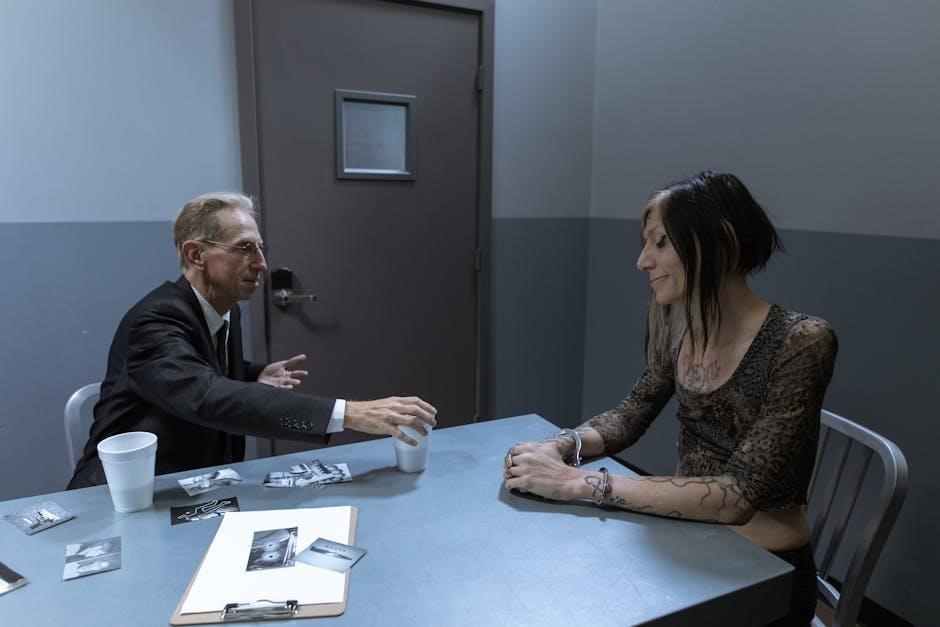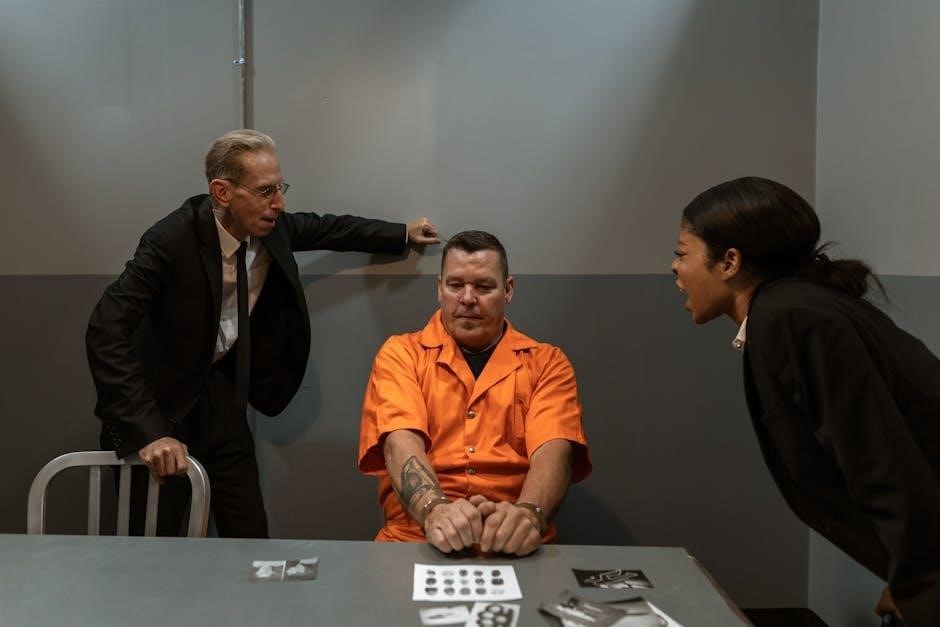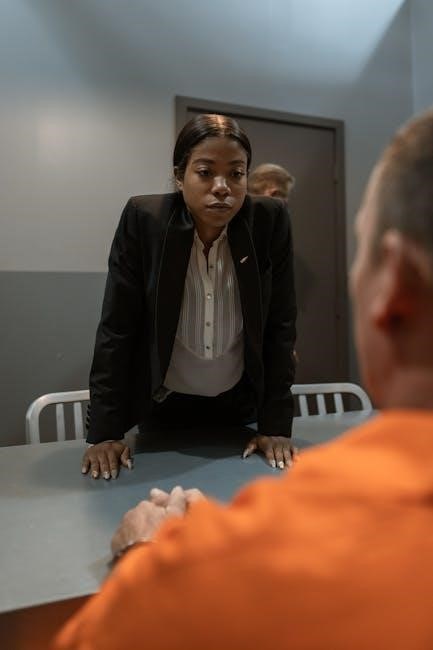Police competency-based interviews assess specific skills and experiences, focusing on real-life scenarios. They evaluate decision-making, communication, and problem-solving abilities. Prepare using the STAR method to structure your responses effectively.
Overview of Competency-Based Interviews
Competency-based interviews focus on assessing specific skills and behaviors relevant to the police role. They use structured questions to evaluate past experiences, ensuring candidates demonstrate skills like problem-solving, communication, and decision-making. These interviews often follow frameworks such as the STAR method, helping candidates provide clear, detailed responses. The goal is to align candidate experiences with the competencies required for effective policing, ensuring a fair and consistent selection process.
Defining Competency-Based Interviews
Competency-based interviews evaluate candidates’ skills and behaviors through structured questions. They focus on real-life examples to assess abilities like leadership, adaptability, and integrity, crucial for policing roles.
What Are Competency-Based Interviews?
Competency-based interviews are structured conversations where candidates demonstrate specific skills and behaviors. These interviews use behavioral questions to assess how individuals have handled past situations, predicting future performance. They focus on key competencies like communication, problem-solving, and leadership, ensuring candidates align with the organization’s values and requirements. Preparation involves reviewing common questions and practicing responses using methods like the STAR technique.
The STAR Method in Answering Questions
The STAR method is a framework for answering behavioral questions: Situation, Task, Action, Result. It helps structure responses clearly, ensuring candidates provide context, their role, actions taken, and outcomes achieved. Using STAR makes answers concise and impactful, demonstrating skills and experiences effectively during interviews. This method is widely recommended for police competency-based interviews to showcase problem-solving and decision-making abilities.

Common Competencies Tested in Police Interviews
Common competencies tested include communication, decision-making, leadership, adaptability, and integrity. These qualities are essential for effective policing and are assessed through behavioral questions.
Communication Skills
Communication skills are vital for police officers, ensuring clear interactions with diverse communities. Questions may ask for examples of effective communication in challenging situations. Be prepared to describe how you conveyed complex information clearly and listened actively. Use the STAR method to structure your response, highlighting the situation, your actions, and the positive outcome achieved through effective communication.
Decision-Making and Problem-Solving
Decision-making and problem-solving are critical competencies for police officers, as they often face high-pressure situations requiring swift, logical actions. Expect questions like, “Describe a time when you had to make a quick decision.” Use the STAR method to structure your response, detailing the situation, your thought process, and the outcome. Highlight how your actions demonstrated sound judgment and effective problem-solving skills in challenging scenarios;
Leadership and Teamwork
Leadership and teamwork are essential for police officers, as they often work in collaborative environments. Questions may include, “Tell me about a time you led a team” or “Describe how you contributed to a group effort.” Use the STAR method to highlight your role, actions, and the positive outcomes. Emphasize how you motivated others, resolved conflicts, or supported team goals, demonstrating your ability to lead and collaborate effectively in challenging situations.
Adaptability and Resilience
Adaptability and resilience are crucial for police officers facing unpredictable situations. Questions like “Describe a time you adjusted to a sudden change” or “Tell me about a challenging situation you overcame” are common. Use the STAR method to illustrate how you remained calm, adapted strategies, and maintained performance under pressure. Highlight your ability to recover quickly and learn from difficult experiences, showcasing your resilience and flexibility in high-stress environments.
Integrity and Impartiality
Integrity and impartiality are core values for police officers, ensuring fair and unbiased decisions. Questions may include, “Tell me about a time you upheld ethical standards” or “Describe a situation where you remained impartial.” Use the STAR method to demonstrate your commitment to fairness, transparency, and moral principles. Highlight how you maintained objectivity and adhered to ethical guidelines, even in challenging scenarios, reflecting your trustworthiness and professionalism.
General Police Interview Questions
General questions assess your background and motivation. Examples include, “Tell me about yourself,” “Why law enforcement?” and “How would your employer describe you?” Prepare concise answers highlighting relevant skills and experiences, demonstrating your suitability for the police role and commitment to serving the community effectively.
Tell Me About Yourself
This question allows you to provide a concise overview of your background, education, and relevant experiences. Highlight skills and achievements that align with policing, such as leadership roles, community involvement, or problem-solving abilities. Keep your response focused and professional, ensuring it reflects your suitability for a career in law enforcement. Avoid personal anecdotes and maintain a clear, structured delivery. Be prepared to connect your past experiences with the competencies required for the police role.
Why a Career in Law Enforcement?
Express your passion for public service, desire to protect communities, and commitment to upholding justice. Highlight personal values like integrity, empathy, and a strong moral compass. Connect your motivation to the skills required in policing, such as problem-solving, decision-making, and teamwork. Show how your career aspirations align with the police force’s mission to maintain safety and trust. Be sincere and specific about what drives your interest in this role.
How Would Your Previous Employer Describe You?
Your previous employer would likely describe you as a dedicated, reliable, and problem-solving individual with strong communication skills. Emphasize your ability to work collaboratively, adapt to challenges, and maintain professionalism under pressure. Highlight your commitment to ethical behavior, attention to detail, and proactive approach to tasks. Ensure your answer aligns with the core competencies required for policing, such as integrity, decision-making, and teamwork, to demonstrate your suitability for the role.
Structuring Your Answers
Use the STAR method to structure your responses: Situation, Task, Action, Result. Ensure clarity, relevance, and conciseness, aligning your experiences with the required competencies for policing roles.
Using the STAR Method Effectively
The STAR method is a framework to answer questions clearly: Situation, Task, Action, Result. Describe the context, your role, the actions you took, and the outcome. Be concise and specific, focusing on your contributions and the impact of your actions. This structure helps demonstrate your competencies effectively, making your responses memorable and aligned with the interviewer’s expectations.

Tailoring Your Answers
Customize your responses to align with the police role, highlighting relevant experiences and skills. Ensure each answer demonstrates how your background matches the competencies required.
Understanding the Police Role
Understanding the police role involves recognizing the core competencies and values required, such as communication, integrity, and adaptability. Research the specific skills and responsibilities of the position, aligning your experiences with the role’s demands. This ensures your answers reflect a deep understanding of the challenges and expectations of policing, demonstrating your suitability for the position.
Aligning Your Experiences with Competencies
To succeed in police competency-based interviews, align your experiences with the required competencies. Highlight skills like communication, decision-making, and leadership. Use the STAR method to structure responses, showing how your past actions demonstrate these competencies. For example, describe a situation where you resolved a conflict or led a team, emphasizing your role and the positive outcome. This ensures your answers directly address the skills the police role demands.
Preparing for Your Interview
Research the police department, practice common questions, and review the competency framework. Use the STAR method to structure your answers, ensuring clarity and relevance to the role.
Researching the Police Department
Understanding the department’s mission, values, and unique challenges is crucial. Research their initiatives, community engagement, and recruitment process to align your answers with their expectations. Familiarize yourself with their Competency and Values Framework, as questions often reflect these areas. This preparation ensures your responses demonstrate how your skills and experiences match their specific needs and priorities effectively.
Practicing Common Questions
Reviewing and practicing common competency-based questions is essential. Familiarize yourself with behavioral prompts like “Tell me about a time when…” Use the STAR method to structure your answers, ensuring clarity and relevance. Practice answering scenario-based questions regarding decision-making, communication, and leadership. This preparation helps build confidence and ensures your responses are concise and impactful during the actual interview.
Reviewing the Competency Framework
Understanding the police competency framework is crucial for success. Focus on key areas such as communication, decision-making, leadership, and integrity. Review how these competencies align with the role and tailor your experiences to reflect them. This ensures your answers demonstrate the specific skills and values the police department seeks, enhancing your performance during the interview process.

The Police Recruitment Process
The police recruitment process involves multiple stages, including application, assessment, interview, and medical checks. Each stage evaluates different skills, with competency-based questions playing a key role in assessing required skills and values.
Stages of the Recruitment Process
The police recruitment process includes several stages: initial application, written assessments, physical fitness tests, psychological evaluations, panel interviews, and medical screenings. Competency-based interviews are a critical component, focusing on specific skills like decision-making and communication. Candidates must demonstrate alignment with the police force’s values and competencies. Each stage is designed to evaluate suitability for the role, ensuring only the most capable candidates progress.
Importance of Competency-Based Questions
Competency-based questions are essential in police interviews as they assess real-life scenarios, ensuring candidates possess necessary skills. They evaluate problem-solving, decision-making, and communication abilities, aligning with the police force’s values. These questions help identify candidates who can handle challenging situations effectively, making them crucial for selecting capable officers. They provide insights into a candidate’s past experiences and their potential to perform in high-pressure roles successfully.
Sample Questions and Answers
Describe a time when you had to make a quick decision under pressure. How did you handle it?
Tell me about a situation where you demonstrated leadership and teamwork.
In an emergency, I assessed the situation, prioritized safety, and took decisive action, ensuring a positive outcome.
I led a team by setting clear goals, communicating effectively, and supporting members, resulting in successful task completion.
Example Questions
- Describe a situation where you had to communicate a difficult message clearly and calmly.
- Tell me about a time when you made a decision under pressure with limited information.
- Give an example of when you demonstrated leadership and teamwork to achieve a goal.
- Describe a challenging problem you solved and how you approached it.
- Tell me about a time when you adapted to a sudden change in plans or priorities.
Example Answers
In a high-pressure situation, I effectively communicated with a distressed individual, ensuring clarity and calmness. My approach de-escalated the tension, resolving the issue peacefully.
Facing a critical decision, I quickly assessed the situation, prioritized safety, and acted decisively, leading to a positive outcome with minimal risks.
I led a team during an emergency, coordinating efforts and allocating tasks based on strengths, resulting in swift and effective resolution.
When solving a complex problem, I broke it into manageable steps, sought input, and implemented a solution that improved efficiency.
Adapting to a sudden change, I remained focused, communicated clearly with my team, and adjusted plans to maintain progress without compromising goals.

VIDEO INTERVIEW TIPS
Ensure a stable internet connection, use a quiet space, and dress professionally. Practice answering competency-based questions using the STAR method. Maintain eye contact and stay focused.
Preparing for a Police Video Interview
Ensure a quiet, well-lit space with minimal distractions. Test your internet connection and equipment beforehand. Practice answering competency-based questions using the STAR method. Review common questions like decision-making scenarios or communication skills. Dress professionally to maintain a professional appearance. Stay calm, maintain eye contact, and speak clearly. Familiarize yourself with the police competency framework to align your answers with their values and expectations.
Common Video Interview Questions
Common video interview questions include: “Describe a time you made a quick decision,” “Tell me about a challenging problem you solved,” or “How did you adapt to a difficult situation?” Questions focus on communication, decision-making, and problem-solving skills. Be prepared to provide specific examples using the STAR method. Practice answering scenario-based questions about leadership, teamwork, and integrity to align with police competencies. Stay calm and articulate, ensuring clear responses.
Best Practices for Video Interviews
Research the department beforehand and use the STAR method to structure answers. Ensure a quiet, well-lit environment with a professional backdrop. Dress appropriately, as you would for an in-person interview. Maintain eye contact with the camera and speak clearly. Stay calm, avoid distractions, and review common questions in advance. Practice your responses to ensure confidence and clarity during the session. This preparation will help you make a positive impression.
Preparation is key to success. Use the STAR method, practice common questions, and stay calm. Show enthusiasm and align your experiences with the competencies required.
Final Tips for Success
Thoroughly research the police department and practice common questions. Use the STAR method to structure answers clearly. Stay calm, be authentic, and showcase your alignment with the role. Highlight your skills and experiences, demonstrating enthusiasm and readiness for the position. Review the competency framework and ensure your responses reflect the values and skills required. Preparation and confidence are key to making a strong impression.





